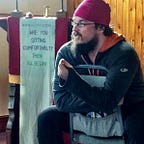Tell it Once. Do it Once
One of the hardest things about needing assistance with accessing services is not just that the use of the service itself takes disproportionately more effort for us than it does for others. The process of obtaining that assistance can also require not just more effort than is asked of those without the same needs, but a level of obtrusiveness and intimate disclosures of information that is often both deeply personal and associated with great trauma.
Areas of life that most people consider private are, when you are disabled, held to be not just fair game for enquiry but required for access to any kind of public or independent life. Which, of course, makes one question just how independent that life is.
To give a personal example, on one occasion when I tried to purchase a washing machine, because I cannot communicate by incoming phone call, in order to arrange delivery from my preferred supplier I had to give detailed information about my medical history on 10 separate occasions to 9 separate people. The only alternative would have been to pay over 10% more to use a company that provides accessible communication with their delivery department as a matter of course.
This is what people mean when they talk about a disability premium. We routinely pay more. In terms of money; in terms of time. And in terms of emotional labour and information.
The result of this, of course, is that all too often we disengage. And so we become less independent. Our lives become smaller. Our ability to participate in the things that, for most people, make up “life” is diminished.
As are the profits of those whose products we no longer engage with!
We start the process of attempting to access goods and services with fewer resources than our peers. And that attempt costs us more resources than it costs them. It is a textbook lesson in how inequalities widen.
A key step to avoiding this is for companies to follow the principle of “tell it once.” I should not have to tell my story 10 times. If I have to tell it at all, I should have to tell it only once, and have it remembered — and communicated for my benefit.
Too often the reason this doesn’t happen is a failure to understand data protection. Companies are overly frightened of disclosing what they have been asked not to — and underly frightened of failing to pass on what they have been asked to. Yet both are equally a part of data protection.
Tell it once is a practice I have advocated on many occasions.
I would like to propose a solution that goes one stage further.
“Do it once” would remove a second cause of greater resource use for disabled people. As the Money and Mental Health Policy Institute have shown, it is harder for many of us to access the most affordable products in areas like utilities because of the resources required to use switching services. Likewise, people with mental health problems are more likely to get caught in unwanted subscriptions because of the difficulty of unsubscribing.
A technology that worked on a “do it once” principle would allow us to set the parameters we use to choose a service and a service provider (which could simply be price or, if we wish, could be tailored around other factors such as sustainability or features such as billing period and billing method, and would include terms and conditions we would and would not be happy with). We would be able to preauthorise contracts on our behalf that met these parameters, and press a button. And then, periodically, an algorithm would find the best deal based on those criteria and sign us up with no further action required.
So that’s my challenge to providers — whether banks or utilities or in other sectors. Offer “tell it once” off the shelf. And build a system that will enable “do it once”.
As always, I am very happy to advice and consult at any stage of the process. Just email me at rogueinterrobang@gmail.com
Dan Holloway has been working in the field of debt and mental health, vulnerability, inclusive design, and accessibility — with a particular focus on financial services — for over a decade.
